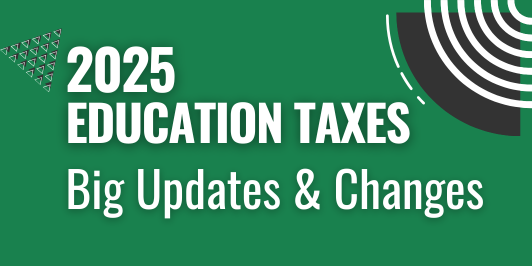For 2025, both IRS indexing and new legislation (including the One Big Beautiful Bill Act, or OBBBA) have changed the way families and students approach education taxes and costs.
5 Education Tax Changes You Need to Know
Here are five education tax changes and updates that could impact your tax return. Avoid surprises come tax time. Reach out to our team today to review your situation and create a plan.
1. Inflation-Adjusted Phaseouts for Tax Credits
The IRS has updated income limits for education-related tax credits:
- American Opportunity Tax Credit (AOTC): To claim the full credit, your modified adjusted gross income (MAGI) must be $80,000 or less ($160,000 or less for married filing jointly). You will also receive a reduced amount of the credit if your MAGI is over $80,000 but less than $90,000 (over $160,000 but less than $180,000 for married filing jointly). And you cannot claim the credit if your MAGI is over $90,000 ($180,000 for joint filers).
- Lifetime Learning Credit (LLC): Phaseout starts if your MAGI is between $80,000 and $90,000 ($160,000 and $180,000 if you file a joint return). Also, you cannot claim the credit if your MAGI is $90,000 or more ($180,000 or more if you file a joint return).
Tip: If your income has increased in recent years, you may lose eligibility. Explore alternative savings or deduction strategies.
2. 529 Plan Documentation Enforcement
The IRS is stepping up audits on 529 withdrawals. If the funds are not properly matched to qualified expenses, they may be taxed with penalties. Saving for College offers five tips for 529 withdrawals, including:
- How to calculate qualified education expenses to ensure tax-free distributions.
- When to time your withdrawals correctly.
- How to coordinate withdrawals from multiple accounts.
- Ways to avoid penalties on non-qualified withdrawals.
- Tips for handling leftover funds after graduation.
Can I still use a 529 for K–12 expenses?
Yes. Up to $10,000 annually can be used for K–12 tuition, though not all states follow federal rules.
Action: Always retain receipts and match distributions to the academic year and student ID.
3. NEW: OBBBA’s Key Education Provisions
Passed in July 2025, OBBBA is reshaping educational planning. Key provisions include:
- Trump Accounts: $1,000 seed deposit for children born in 2025 or later, with $5,000 in annual contributions allowed. Funds can be used for college, vocational training, or homeownership.
- Private School Tax Credit: Donors to Scholarship Granting Organizations (SGOs) now qualify for a federal dollar-for-dollar tax credit.
- Endowment Tax: Colleges with large endowments will pay a tiered tax, which may indirectly affect tuition and aid availability.
- Student Loan Caps & Repayment Rules: Borrowing is now limited for professional and graduate programs, and income-driven repayment plans have changed.
Planning Tip: If you’re contributing to education savings or applying for financial aid, factor in the effects of these provisions now.
4. State-Level Tax Incentives for Education
Several states are offering new or expanded deductions for:
Check our tax team for details, as these programs vary widely.
5. Scholarship Taxability Rules Remain the Same—for Now
Scholarships used for tuition, books, and mandatory fees remain tax-free. However, if used for room, board, or travel, they are still taxable. If you receive a scholarship, a fellowship grant, or other grant, all or part of the amounts you receive may be tax-free, if you meet the following conditions:
- You’re a candidate for a degree at an educational institution that maintains a regular faculty and curriculum and normally has a regularly enrolled body of students in attendance at the place where it carries on its educational activities; and
- The amounts you receive are used to pay for tuition and fees required for enrollment or attendance at the educational institution, or for fees, books, supplies, and equipment required for courses at the educational institution.
2025 Is A Pivotal Year
With a combination of IRS indexing, state-level changes, and federal legislation via OBBBA, 2025 is shaping up to be a pivotal year for education tax strategy. Proactive planning now can lead to significant savings later.
Action Steps:
- Reassess your eligibility for education credits,
- Maximize 529 efficiency, and
- Consult with your advisor to update your education funding plan.
We help families, students, and professionals make sense of the changing tax landscape. Contact us to review your 2025 education tax strategy.
